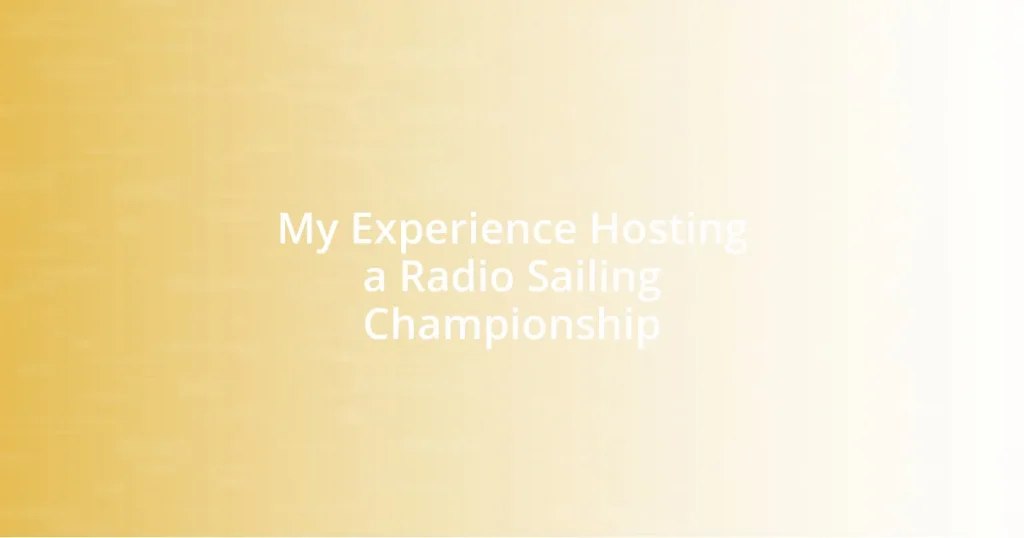Key takeaways:
- Preparation was a mix of excitement and responsibility, emphasizing the importance of creating a welcoming atmosphere for participants.
- Understanding and respecting racing rules fosters a fair and enjoyable competition while promoting camaraderie among sailors.
- Engaging volunteers and participants through genuine connections enhances community spirit and makes the event memorable.
- Post-event evaluations and feedback from participants and volunteers are crucial for continuous improvement and strengthening community ties.

Preparing for the Championship
Preparing for the championship was both thrilling and nerve-wracking. I remember the late nights spent coordinating logistics, wondering if I had overlooked even the tiniest detail. Did I confirm the venue? Would the weather cooperate? The weight of responsibility hung in the air, but those moments of doubt pushed me to double-check everything.
The day before the event was a whirlwind of activity. As I walked along the shoreline, setting up the sailing markers, I felt a surge of excitement. I thought about the competitors who would soon arrive, each of them eager to prove their skills. Did they have the same mix of anticipation and anxiety that I felt? I wanted to ensure that every sailor had a memorable experience, so I meticulously arranged everything, hoping to create a welcoming atmosphere.
As the championship day approached, I took a step back to reflect on what really mattered. It wasn’t just about winning; it was about community and the shared love of sailing. I felt a deep sense of fulfillment watching friends and strangers come together, ready to celebrate their passion. Isn’t it incredible how an event can unite so many different people?

Understanding Radio Sailing Rules
Understanding the rules of radio sailing is crucial for both competitors and organizers. From my experience, these rules, often derived from the broader sailing regulations, ensure a fair and enjoyable competition. When I first dove into hosting, I found it fascinating to see how small changes in the rules could significantly affect racing strategies and the overall dynamics of the event.
The racing rules, including start sequences and penalties for rule infringements, create a competitive but friendly environment. For instance, one rule I had to emphasize was keeping proper distance during starts to avoid collisions; I recall a tense moment during practice when a close call almost turned into a much bigger mishap. These experiences remind us of the importance of respecting these guidelines, as they not only govern the competition but also foster camaraderie among participants.
Another aspect I appreciated was the emphasis on fairness. For example, everyone must adhere to the class rules tailored for their specific boat type. At one event, I witnessed a team conducting a quick check on their equipment to ensure compliance, which inspired other teams to do the same. Ensuring that everyone is on the same page about the rules helps maintain trust and integrity, ultimately enhancing the enjoyment of the championship experience.
| Topic | Description |
|---|---|
| Start Sequence | Rules governing the timing and procedure of race starts. |
| Penalty System | Mechanics behind handling infringements during the race. |
| Class Rules | Specific regulations pertaining to different boat types used in the competition. |

Organizing the Event Logistics
Organizing the logistical elements for the radio sailing championship was a complex puzzle. I often found myself juggling multiple tasks, from ensuring that the venue was set up correctly to arranging for catering and accommodations for out-of-town participants. Each detail felt like a thread in a larger tapestry, and losing focus on one could unravel everything. I remember the moment the supplies arrived and seeing the boxes piled high. It gave me a rush of joy and relief; I was finally piecing everything together.
Here’s a quick breakdown of the key logistics I tackled:
- Venue Coordination: Securing a location that had the right water conditions and accessibility.
- Equipment Management: Renting and organizing boats, buoys, and safety gear.
- Catering Arrangements: Providing meals and refreshments for participants and volunteers.
- Volunteer Assignments: Recruiting and assigning roles to help run the event smoothly.
- Weather Contingency Plans: Preparing backup plans in case of inclement weather.
As the championship day approached, it was like orchestrating a symphony but my instruments were all the components of the event instead. I can’t tell you how satisfying it was to see everything come together: the sailboats ready on the water, the snacks neatly arranged for the crowd, and the laughter of friends catching up. This stage, filled with excitement and anticipation, was more than just about logistics; it was the heartbeat of the event.

Engaging Participants and Volunteers
Engaging participants and volunteers requires a genuine connection—something I discovered early on during my hosting experience. I remember a moment of serendipity when a casual chat with a volunteer sparked an idea for a team-building exercise that not only boosted morale but also turned into a fun pre-race ritual. The camaraderie among participants and volunteers blossomed, as everyone began contributing their unique skills and ideas. Who would have thought that a simple conversation could have such a profound impact?
I also showed my appreciation for volunteers in small but meaningful ways, like organizing a thank-you dinner after the championship. This gathering allowed everyone to relax and share stories from the event, creating lasting bonds among the team. Reflecting on that night, I realized how vital it is to recognize the hard work and dedication of every individual involved. It made all of us feel valued and more invested in the success of the event.
As I think back, I wonder if engaging volunteers and participants is more about the formal planning or the spontaneous moments that arise during the chaos. When you foster a sense of belonging—inviting everyone to share their thoughts and experiences—the spirit of collaboration flourishes. I learned that participants don’t just show up for the competition; they come for the community. That’s what makes hosting truly unforgettable.

Managing Race Day Operations
Managing race day operations felt like directing a live show, where timing and precision were key. I vividly recall the adrenaline rush as I oversaw the registration table, ensuring that each sailor got their materials and felt welcomed. The atmosphere was electric, and every time I caught someone smiling with their race pack, I felt a sense of accomplishment. It wasn’t just about the logistics; it was the shared excitement, the conversations buzzing around me, that truly energized the venue.
As the races began, I closely monitored the start lines and communicated with the race officials, balancing chaos with coordination. There was this crazy moment when I realized a few boats were about to cross the line early, and my heart raced. Quickly, I shouted to the officials, waving my hands to signal a delay. It was tense but thrilling—an instant reminder of how critical communication is during such events. In that heartbeat of urgency, I understood that providing clear instructions and maintaining a calm presence can significantly impact race day flow. Isn’t it fascinating how a single moment can highlight the importance of teamwork and focus?
I made it a point to routinely check in with volunteers stationed around the water. Every time I saw their nod of approval or heard their laughter amidst the busy sounds of racing, it filled me with gratitude. That rapport built not only made them feel part of the mission but allowed me to gather vital feedback in real-time. How often do we pause to recognize that our success hinges on these unsung heroes? For me, managing race day operations was as much about leading a team and fostering that sense of belonging as it was about ensuring the event ran smoothly.

Evaluating Performance and Feedback
Evaluating performance during the championship was an enlightening process. I remember sitting down with my team right after the event, sharing bites of leftover cake while we dissected what went well and what left room for improvement. Those honest conversations were not just about critiquing; they were about celebrating small victories too. How often do we overlook our achievements amid the hustle? Reflecting back, I realized each piece of feedback helped shape a clearer picture of our strengths and areas needing attention.
Gathering feedback from participants added another layer of insight. During the awards ceremony, I casually approached several sailors to hear their thoughts on the event. Their responses varied from euphoric praise to constructive criticisms. What struck me was how enthusiastic they were to share, illustrating a genuine investment in the whole experience. This two-way dialogue reinforced my belief that when participants feel heard, they become even more committed to future events. Isn’t it powerful how engagement breeds more engagement?
One of the most rewarding aspects was analyzing the feedback together with my volunteers. We transformed critiques into actionable changes for next time, fostering a sense of ownership among the team. For instance, one volunteer suggested using colored flags for better visibility during races, which sparked this creative brainstorm for enhancing the race experience. It reminded me that evaluation isn’t just a one-off post-event task; it’s an ongoing dialogue that strengthens community ties. What can be more fulfilling than knowing that our efforts are paving the way for greater experiences in the future?

Reflecting on the Experience
Reflecting on the experience of hosting the radio sailing championship, I often find myself smiling at the connections we forged over those days. It felt incredible to share laughs and stories with sailors and volunteers alike, each bringing their unique flavor to the occasion. Can you imagine the warmth of those moments? It made the event feel less like a mere competition and more like a homecoming for our sailing community.
One moment that stands out in my mind is the camaraderie that blossomed during the setup. I remember a volunteer, a seasoned sailor, sharing tips about rigging while we untangled lines. That spontaneous workshop turned a mundane task into an engaging learning experience. How often do we realize that these little interactions are what truly enrich our events? In those times, I felt a wave of gratitude realizing that every individual played an essential role in creating the atmosphere we cherished.
Looking back, the victories mattered, but it was the collective spirit that left a lasting imprint on my heart. As I strolled along the shoreline, witnessing families cheering for their participants, I felt a sense of pride swell within me. It was a reminder of why I love hosting events—because it’s about building memories together. Don’t you think it’s those shared experiences that linger far longer than any trophy? Reflecting on all this makes me excited for future competitions and the relationships yet to bloom.















